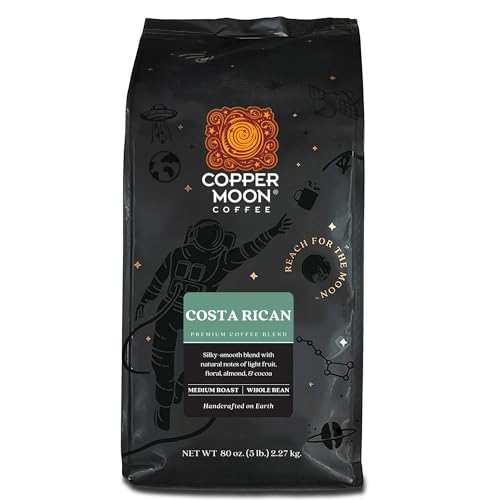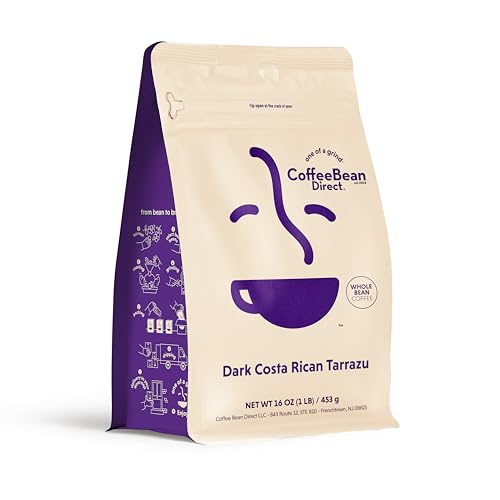Costa Rican coffee holds a prestigious place in the world of specialty beans. Grown in rich volcanic soil at high altitudes, these beans are celebrated for their balanced, clean, and complex flavor profiles. From the bright, citrusy notes of a light roast to the deep, chocolatey undertones of a dark roast, there’s a Costa Rican coffee to suit every palate.
Choosing the right one can elevate your daily brewing ritual. This roundup simplifies your search by highlighting eight exceptional whole bean coffees, detailing their unique characteristics, roast profiles, and key features to help you find your perfect cup.
Our Top Picks for Costa Rican Coffee
- Copper Moon Whole Bean Coffee, Medium Roast
- Café Britt Tres Rios Valdivia Whole Bean Coffee
- Coffee Bean Direct Dark Costa Rican Tarrazu
- Costa Rica Peaberry Coffee, Whole Bean
- Café Britt Tres Rios Valdivia Coffee (3-Pack)
- Coffee Bean Direct Costa Rican Tarrazu, Light Roast
- Cafe Britt Whole Bean Coffee, Dark Roast, Tarrazu
- Volcanica Costa Rica Peaberry Coffee, Whole Bean
Copper Moon Whole Bean Coffee, Medium Roast

This premium medium roast blend is cultivated in Costa Rica’s volcanic soil, promising a lively and satisfying taste profile. It is celebrated for its aromatic qualities, releasing a delightful nuttiness during brewing that complements the rich coffee fragrance.
The flavor is a silky smooth and complex blend, featuring notes of light fruit, floral hints, and subtle undertones of toasted almond and light cocoa. Copper Moon ensures a worry-free cup, as this coffee is gluten-free, mold-free, allergen-free, kosher certified, and non-GMO. Using whole beans guarantees maximum freshness and flavor when ground just before brewing.
Café Britt Tres Rios Valdivia Whole Bean Coffee

Café Britt offers a gourmet medium-light roast from the esteemed Tres Rios region, often called the “Bordeaux of Costa Rica.” This single-origin Arabica coffee is the result of generations of traditional growing, milling, and sun-drying practices passed down through families.
The outcome is a remarkably complex and balanced cup of coffee. A key feature of this coffee is its ability to hold its flavor profile perfectly, whether you prefer to serve it hot or enjoy it as a refreshing iced coffee. It is also certified Kosher and gluten-free.
Coffee Bean Direct Dark Costa Rican Tarrazu

For those who appreciate a bolder brew, this Dark Costa Rican Tarrazu offers a full-bodied and richly roasted experience. Sourced from the famous Tarrazu region, the beans benefit from the ideal climate and volcanic soil, creating a coffee with significant complexity.
Roasted to a dark profile, this coffee brings out natural tasting notes of citrus, dark chocolate, and a distinct honey sweetness. The finish is smooth with a gentle, smoky character that is deeply satisfying. It is an excellent choice for various brewing methods, including French press and cold brew.
Costa Rica Peaberry Coffee, Whole Bean

This coffee features the unique Peaberry bean, a natural mutation where a single, round bean forms inside the coffee cherry instead of the usual two flat-sided beans. Sourced from the La Isabela Estate in Tres Rios, this single-origin coffee is shade-grown and rain forest certified.
The medium roast brings out a balanced and intense flavor profile characterized by mild, sweet, and bright notes of fruit and citrus. For those concerned about quality and safety, this coffee undergoes rigorous testing for mold and mycotoxins before and after export, ensuring a fresh and pure product.
Café Britt Tres Rios Valdivia Coffee (3-Pack)

This three-pack offers the same premium Café Britt Tres Rios Valdivia coffee in a convenient bulk option. The medium-light roast boasts an aroma of honey-nut and flavors of plum, allspice, and orange citrus, providing a truly gourmet experience.
A significant advantage of Café Britt is that the coffee is picked, roasted, and packed directly in Costa Rica, ensuring exceptional freshness. Furthermore, the company is committed to sustainability, having been certified carbon neutral since 2013, so you can enjoy your coffee with a clear conscience.
Coffee Bean Direct Costa Rican Tarrazu, Light Roast

This light roast from the Tarrazu region showcases a completely different side of Costa Rican coffee. The lighter roasting process allows the bean’s inherent brightness and delicate flavors to take center stage.
You can expect a smooth and balanced brew with distinct notes of tart lemon, milk chocolate, and honey. The result is a sweet cup with a pleasant, fruity aroma that is perfect for those who enjoy a less intense, more nuanced coffee. It works wonderfully with pour-over or AeroPress brewing methods.
Cafe Britt Whole Bean Coffee, Dark Roast, Tarrazu
This offering from Café Britt focuses on a dark roast profile from the Tarrazu region. Dark roasts from this area are known for their robust body and ability to develop deeper, richer flavor notes while maintaining the coffee’s inherent balance.
Ideal for those who prefer a strong and intense cup, this coffee likely presents characteristics of dark chocolate, caramelized sugars, and a smooth finish. As with other Café Britt products, you can expect high-quality, gourmet Arabica beans roasted with expertise.
Volcanica Costa Rica Peaberry Coffee, Whole Bean
Volcanica brings a Peaberry coffee that capitalizes on the unique qualities of this rare bean type. Grown in the volcanic regions of Costa Rica, these beans are known for their concentrated flavor and brighter acidity compared to standard beans.
This whole bean coffee is typically roasted to highlight its vibrant and complex character, which often includes notes of citrus, berry, and a clean, sweet finish. Peaberry coffees are highly sought after for their uniform shape and size, which allows for a more even roast and a distinct taste experience.
Buying Guide: How to Choose Your Costa Rican Coffee
When I’m looking for a new bag of Costa Rican coffee, the first thing I check is the region. Costa Rica has several distinct microclimates, and each one imparts a unique character to the beans. Tarrazú is probably the most famous, known for producing beans with a full body and bright, wine-like acidity. If you prefer a cleaner, softer cup, look for beans from the Central Valley. For something truly unique, I seek out coffees from the West Valley, which often have fruity and complex notes, or from Tres Ríos, which are known for their balanced acidity and aromatic quality.
Next, I always look at the roast date, not the expiration date. Coffee is at its best within a few weeks of being roasted. I avoid bags that don’t have a roast date printed on them, as they could be months old and stale. For Costa Rican beans, which are prized for their clarity and nuanced flavors, freshness is non-negotiable.
The processing method is another big factor. The vast majority of Costa Rican coffee is honey processed or washed. Washed (or wet-processed) coffees are clean, bright, and let the pure flavor of the bean shine through. Honey processed coffees are a signature of the country; they leave some of the sticky fruit mucilage on the bean during drying. This gives the final cup more body and a sweetness that often reminds me of brown sugar or honey itself. I tend to choose honey process when I want a richer, sweeter experience.
Finally, I consider the roast level. A light to medium roast is my go-to for Costa Rican beans. Dark roasts can overpower the very delicate and complex flavors that make this origin so special. A lighter roast preserves those bright citrus notes, floral aromas, and subtle fruit tones that I’m paying for. I save dark roasts for blends or more robust single-origins.
When you’re evaluating your options for the 8 best Costa Rican coffee: buying, brewing, and key details, paying attention to these four elements—region, roast date, process, and roast level—will guide you to a bag you’ll truly enjoy. It turns a simple purchase into a curated experience.
FAQ
What makes Costa Rican coffee so good?
Costa Rica has a perfect combination of high-altitude volcanic soil, stable climate, and a deep-rooted culture of quality. The government actually banned the production of lower-quality Robusta beans, meaning all coffee grown there is the superior Arabica species. Farmers are also incredibly skilled and often use modern honey processing techniques that enhance sweetness and body. It’s a country that is completely dedicated to producing exceptional coffee.
What is the difference between Tarrazú and other Costa Rican coffee regions?
Tarrazú is the powerhouse region, famous for its intense acidity and full body. Think of it as the boldest expression of Costa Rican coffee. Other regions, like the Central Valley, produce cups that are milder and more balanced. The West Valley is known for fruitier, more complex profiles, while Tres Ríos offers a classic, elegant balance. They are all high-quality, but they speak with different regional accents.
How should I brew my Costa Rican coffee?
I find that pour-over methods like a Hario V60 or Chemex are fantastic for highlighting the clean, bright notes of a washed Costa Rican coffee. For a honey process, a French press can really emphasize that inherent sweetness and heavier body. If you use an automatic drip machine, just make sure you’re using a good grinder and fresh, filtered water. The goal is to let the bean’s natural character be the star.
Why is the “honey process” so common in Costa Rica?
Costa Rican producers pioneered and perfected the honey process as a middle ground between the traditional washed and natural methods. It uses significantly less water than the washed process, making it more environmentally friendly. More importantly, it allows producers to create a uniquely sweet and syrupy cup profile that has become a signature of the country’s specialty coffee scene, setting it apart from its Central American neighbors.
Is expensive Costa Rican Geisha coffee worth the price?
Geisha is a specific, rare variety of coffee plant known for its incredibly floral and tea-like flavors. Costa Rican farms, particularly those at very high altitudes, produce some stunning Geishas. If you are a coffee enthusiast who loves to taste nuanced notes of jasmine, bergamot, and tropical fruit, then yes, splurging on a small bag for a special occasion can be a memorable experience. For your daily drinker, there are plenty of amazing and more affordable classic Caturra or Catuai varieties from Costa Rica.
